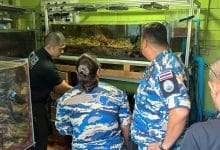Steve Galster roars: Let’s trade wildlife for a pandemic-free world

Steve Galster, the founder and CEO of the anti-trafficking organisation Freeland, has advocated for the complete eradication of illegal and legal wildlife trade to avert the possibility of the next pandemic. He highlighted that Thailand, with its superior infrastructure, has been a longstanding hub for such activities, facilitating the movement of wildlife trade from source countries like Africa and Indonesia to markets such as China.
Animals like pangolins, once common in Thailand, are now caught in Indonesia and smuggled across the border with Malaysia and Myanmar. Dead pangolins or their scales, highly valued in Chinese medicine, are also shipped from Africa. However, the list of trafficked wildlife trade is not limited to pangolins, Galster explained.
“We’ve got tiger skins, and bones in particular. We’ve got other big cats, leopards. We’ve got lion carcasses being trafficked over from southern Africa. We have wild birds being shipped in from Brazil.”
The consequences of wildlife trade trafficking are threefold. Firstly, the animals suffer immensely during the transportation process. Secondly, many of these trafficked species are endangered, with some on the brink of extinction. The UN reports that approximately 100 species of plants and animals go extinct daily, and one million are teetering on the brink of extinction. While habitat loss due to farming expansion is the primary cause, smuggling is another significant factor.
Lastly, the threat to human survival cannot be undermined, with the potential of a more deadly pandemic being sparked by zoonotic transmission. Galster pointed out that scientists believe the Covid-19 outbreak was probably triggered by a virus transmitted from raccoon dogs in a commercial market in Wuhan.
“Now, those raccoon dogs would have been commercially traded. You can find raccoon dogs in Chatuchak market today. So we should be concerned about all of this.”
The 61 year old Galster strongly believes that a ban on commercial wildlife trade is the way forward as the benefits of such trade are enjoyed by a minuscule percentage of the population, whereas the risks are borne by a vast number of people and animals.
Latest Thailand News
Follow The Thaiger on Google News:


























